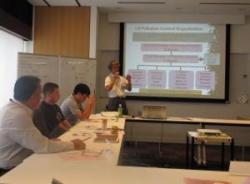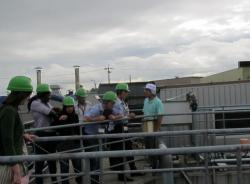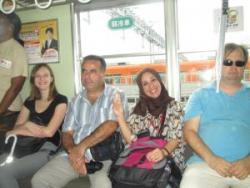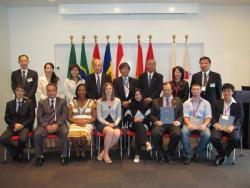Home > Workshop and Training > IN JAPAN > Fiscal Year 2011 > FY2011 JICA Training Course Starts on "Pollution Control and Local Environment Management" > FY2011 JICA Training for Pollution Control and Local Environment Management Closes
Main content starts here.
Update:October 19, 2011
FY2011 JICA Training for Pollution Control and Local Environment Management Closes
A fiscal 2011 JICA Training for Pollution Control and Local Environment Management was held from August 21 to October 6. It was attended by eight participants from seven countries: Algeria, Brazil, Ghana, Moldova, Macedonia, Tajikistan, and Vietnam.

This training course focused on water pollution issues. This course provided not only general pollution control measures consisting of legal and penalty systems, but also technical knowledge and practice that help small and medium-sized enterprises and their surrounding communities to voluntarily enhance their capacity of environment management.
<Lecture on on-the-spot inspection>

The mentally and physically demanding training period of one month and a half was packed with following activities: more than fifteen sets of lectures on the Japanese legal systems and on pollution control and measuring technologies, and over fifteen sets of extracurricular exercise sessions consisting of the visits to various wastewater facilities and the participation in environment management activities led by nonprofit organizations or local governments.
<Lecture on Pollution Control Manager System>

During the training period, the participants didn’t always stay indoors at the ICETT in the quiet Suzuka foothills but visited large bustling cities, such as Kyoto, Osaka, and Kobe, to experience various aspects of Japan. In these cities, they planned to use the public transportation system as much as possible, especially trains: they bought tickets at ticket vending machines, went through automatic ticket gates, and changed train somewhere. On the trains, sitting next to Japanese strangers may have caused a touch of anxiety. I believe, however, that through these experiences they felt they were actually staying in Japan by doing as same as Japanese residents did, not by moving around the cities in a hired bus as foreigner tourists.
<Visit to wastewater disposal facilities of small and medium-sized factories>
They visited temples in Kyoto, walked around the busy Dotonbori area in Osaka, and saw the beautiful scenery of Kobe from the sea,  just like they were on a high school or junior high school trip. There were some cases in which participants got lost in the crowd. Everyone was relieved when they managed to find their way back to the group, using their faltering Japanese. Something exceptional or unexpected happened on almost every holiday, but these experiences are very likely to turn into fond memories, such as the unexpected surprise they felt encountering Japanese kindness on their trips. This gave them opportunities to develop a positive and friendly image of Japan, outside the training course itself.
just like they were on a high school or junior high school trip. There were some cases in which participants got lost in the crowd. Everyone was relieved when they managed to find their way back to the group, using their faltering Japanese. Something exceptional or unexpected happened on almost every holiday, but these experiences are very likely to turn into fond memories, such as the unexpected surprise they felt encountering Japanese kindness on their trips. This gave them opportunities to develop a positive and friendly image of Japan, outside the training course itself.
<Experiencing a train trip>

Back at ICETT from the trip, the participants had a little more a week left for the course. They plunged into their busiest three days, visiting some facilities related to local environment management. Then, on a holiday before the presentation of their reports, they confined themselves to their rooms all day long to finish them, like schoolkid trying to complete his summer vacation homework. I am pleased that some of the participants mentioned the sorting of garbage with local residents and the disciplined education on the environment as important experiences in their reports. Attitudes like this show their interest in local environment management.
<Commemorative shot at closing ceremony>
Six months after returning to their countries, they are scheduled to report on the progress in their action. We are highly expecting some positive responses from them.
We would very much like to express our gratitude to the companies, organizations and others involved in this course for the cordial support and cooperation.
(Taniguchi)







